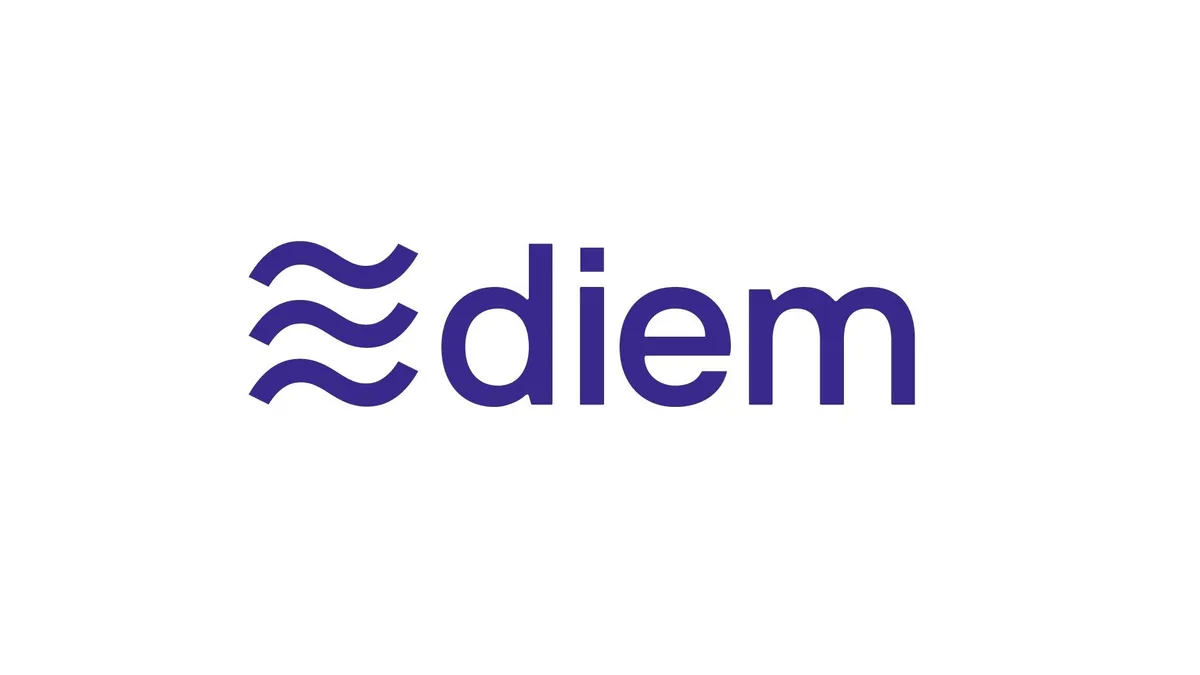Dive Brief:
- La Jolla, California-based Silvergate Bank is buying the Diem Association's assets for $182 million, the bank said Monday. That figure breaks down to $50 million in cash and more than 1.2 million shares.
- The bank intends to launch a stablecoin this year using the assets it acquired in the Diem deal, along with Silvergate's existing technology, CEO Alan Lane said in a release.
- Silvergate agreed in May 2021 to be the exclusive issuer of the Diem USD stablecoin and to manage the currency reserve. Federal Reserve officials last summer refused to give Silvergate their sign-off on the arrangement, effectively putting the Facebook-backed digital currency effort at a standstill, Bloomberg reported Wednesday, citing people familiar with the matter.
Dive Insight:
The deal effectively ends Facebook’s circuitous 2½-year journey in the digital currency space — one fraught with pushback from the start. Libra, as Diem was first known, was pitched in June 2019 as a token backed by a basket of currencies. Lawmakers and regulators in the U.S. and European Union nearly immediately raised concerns over the digital asset’s potential to enable money laundering and terrorism financing.
Senate and House committees summoned Facebook CEO Mark Zuckerberg and Libra co-creator David Marcus to testify the following month. And two Democratic U.S. senators in October 2019 wrote letters urging the CEOs of Stripe, Mastercard and Visa to reconsider their companies’ backing of the project. They did.
Libra scaled back its ambitions, rebranded itself and applied for a payments system license from the Swiss regulator Finma. Months later, it withdrew that application, switched focus to the U.S. and registered as a money services business with the Financial Crimes Enforcement Network (FinCEN). That's also when Diem and Silvergate began collaborating in earnest.
The bank said Monday it expects to incur about $30 million in additional costs this year tied to the integration of Diem's technologies. None of that will be from hiring any of Diem's engineers, Lane told Bloomberg.
“We didn’t hire anybody from Facebook, anybody from Diem,” he said. “We are a regulated financial institution running the payment network.”
The sale may stand as an attempt to return some value to Diem’s investors, who committed $10 million apiece when the association of the then-Libra Association launched. Backers include Coinbase, Andreessen Horowitz, Uber, Lyft, Spotify, Shopify, Ribbit Capital and Singapore’s Temasek Holdings.
Diem’s chief executive, Stuart Levey, said the association sought to address concerns over potential misuse of its system and received “positive substantive feedback,” according to the Financial Times. But ultimately, after talks with federal regulators, executives realized “the project could not move ahead.”
Lane, meanwhile, told CNBC that Silvergate execs “think the potential worth is off the charts when we think about using the blockchain technology for payments and remittance.”
Red flags
Rumors of Diem's sale and potential wind-down began circulating last week, but there have been a handful of red flags.
Facebook in October launched a pilot of its digital currency wallet, Novi, but did so without Diem, the stablecoin it was built to hold. Novi opted to use the Paxos Dollar instead, with Coinbase providing custody services.
Diem, at the time, appeared very much in the picture. "Our support for Diem hasn’t changed and we intend to launch Novi with Diem once it receives regulatory approval and goes live," Marcus wrote on Twitter.
A month later, Marcus announced he would leave Facebook — by then rebranded Meta — at the end of 2021.
Another potential stumbling block for Diem may have been a report the President’s Working Group on Financial Markets issued in November asking Congress to pass legislation that would require issuers of the digital assets be insured depository institutions subject to the same regulations as traditional banks.
When the working group convened in July, Treasury Secretary Janet Yellen pressed attendees to "act quickly to ensure there is an appropriate U.S. regulatory framework in place." Though the group’s initial summary of the meeting was sparse in detail, sources told Bloomberg days later that Diem and Tether were the impetus behind Yellen's directive.
Diem’s absence was noted, too, in December, when executives from six cryptocurrency companies testified on Capitol Hill on the "challenges and benefits of financial innovation."
As regulators lean toward a tougher stance on stablecoins, Silvergate updated its application with the New York Department of Financial Services to form a limited purpose trust company to hold dollar stablecoin reserves, Bloomberg reported last week.
Lane said Silvergate is "not concerned … at all" at the prospect of a potential Fed-backed digital currency treading on a space now occupied by stablecoins. If the central bank were to issue a digital dollar, its arrival on the market likely would be several years away.















